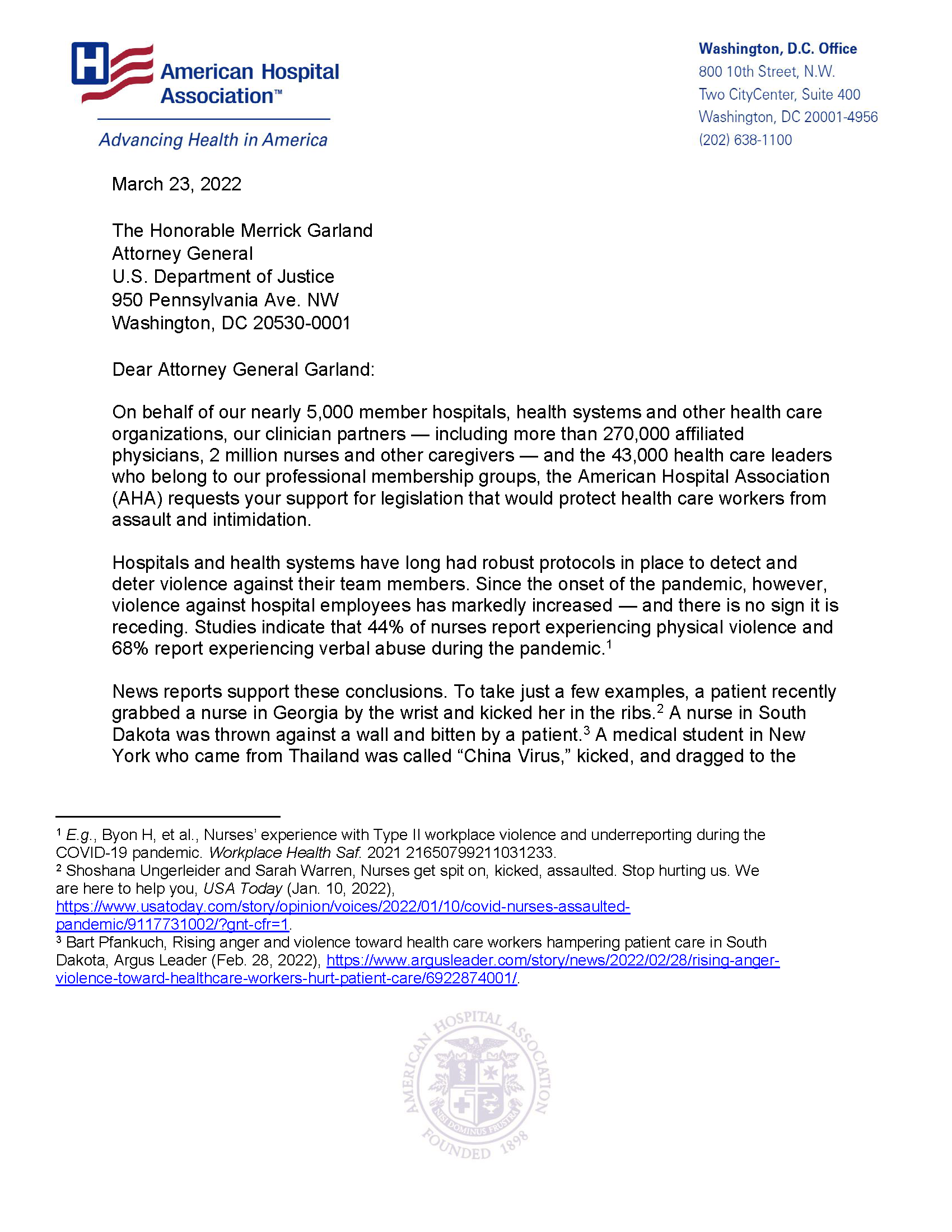

AHA Letter to Attorney General Merrick Garland on Workforce Violence
March 23, 2022
The Honorable Merrick Garland
Attorney General
U.S. Department of Justice
950 Pennsylvania Ave. NW
Washington, DC 20530-0001
Dear Attorney General Garland:
On behalf of our nearly 5,000 member hospitals, health systems and other health care organizations, our clinician partners — including more than 270,000 affiliated physicians, 2 million nurses and other caregivers — and the 43,000 health care leaders who belong to our professional membership groups, the American Hospital Association (AHA) requests your support for legislation that would protect health care workers from assault and intimidation.
Hospitals and health systems have long had robust protocols in place to detect and deter violence against their team members. Since the onset of the pandemic, however, violence against hospital employees has markedly increased — and there is no sign it is receding. Studies indicate that 44% of nurses report experiencing physical violence and 68% report experiencing verbal abuse during the pandemic.1
News reports support these conclusions. To take just a few examples, a patient recently grabbed a nurse in Georgia by the wrist and kicked her in the ribs.2 A nurse in South Dakota was thrown against a wall and bitten by a patient.3 A medical student in New York who came from Thailand was called “China Virus,” kicked, and dragged to the ground, leaving her hands bleeding and legs bruised.4 The president of Mercy Health Saint Mary’s in Michigan has reported: “Our staff are yelled at, punched, hit, scratched, we hear about these on a day-to-day basis.”5 And a Maine nurse has said: “We have been hit, bitten, choked, shoved, kicked, spit upon, and concussed.”6
Workplace violence has severe consequences for the entire health care system. Not only does it cause physical and psychological injury for health care workers, but workplace violence and intimidation make it more difficult for nurses, doctors and other clinical staff to provide quality patient care. Nurses and doctors cannot provide attentive care when they are afraid for their personal safety, distracted by disruptive patients and family members, or traumatized from prior violent interactions. In addition, violent interactions at health care facilities tie up valuable resources and can delay urgently needed care for other patients. Studies show that workplace violence reduces patient satisfaction and employee productivity, and increases the potential for adverse medical events.
For medical professionals, being assaulted or intimidated can no longer be tolerated as “part of the job.” This unacceptable situation demands a federal response.
Last year, you took decisive action to address the rise in violent behavior on commercial aircraft by directing United States Attorneys to prioritize prosecutions when airline employees were harmed by passengers. You wrote: “The Department of Justice is committed to using its resources to do its part to prevent violence, intimidation, threats of violence, and other criminal behavior that endangers the safety of passengers, flight crews, and flight attendants on commercial aircraft.” As you recognized, vigorous enforcement creates a safe traveling environment, deters violent behavior, and ensures that offenders are appropriately punished.
Our nation’s health care workers deserve the same protections and the same commitment from the Department of Justice. Unfortunately, there is no existing federal statute that protects health care workers from the even greater incidence of violence that they experience. We therefore urge you to support legislation, modeled after 18 U.S.C. § 46504, that would provide similar protections as those that currently exist for flight crews and airport workers.
From the day you took office as Attorney General, you have honored the Justice Department’s obligation to protect the American people against violence and threats of violence. The AHA applauds your unwavering commitment to making our communities safer. We look forward to working with you to ensure that a key pillar of those communities — hospitals and health systems — can focus on caring for their patients without having to fear violence against their employees.
Sincerely,
/s/
Richard J. Pollack
President and Chief Executive Officer
- E.g., Byon H, et al., Nurses’ experience with Type II workplace violence and underreporting during the COVID-19 pandemic. Workplace Health Saf. 2021 21650799211031233.
- Shoshana Ungerleider and Sarah Warren, Nurses get spit on, kicked, assaulted. Stop hurting us. We are here to help you, USA Today (Jan. 10, 2022), https://www.usatoday.com/story/opinion/voices/2022/01/10/covid-nurses-assaulted-pandemic/9117731002/?gnt-cfr=1.
- Bart Pfankuch, Rising anger and violence toward health care workers hampering patient care in South Dakota, Argus Leader (Feb. 28, 2022), https://www.argusleader.com/story/news/2022/02/28/rising-anger-violence-toward-healthcare-workers-hurt-patient-care/6922874001/.
- Sydney Pereira, 'White Coats Don’t Protect Us:' Asian Health Care Workers Speak Out Against Rise In Hate Crimes, Gothamist (Apr. 22, 2021), https://gothamist.com/news/white-coats-dont-protect-us-asian-health-care-workers-speak-out-against-rise-in-hate-crimes.
- Andrew Feather, Healthcare workers face increasing violence from patients amid COVID-19 surge, News Chanel 3 (Dec. 9. 2021), https://wwmt.com/news/local/healthcare-workers-face-increasing-violence-from-patients-amid-covid-19-surge.
- Chris Costa, Maine Medical Center ER nurses detail violent patient attacks, demand change, News Center Maine (Feb. 25, 2022), https://www.newscentermaine.com/article/news/health/emergency-room-nurses-demand-change-after-violent-conditions-at-maine-medical-center-portland/97-929dd8c5-2c5b-4901-a9d7-a138ac94cfa9.


